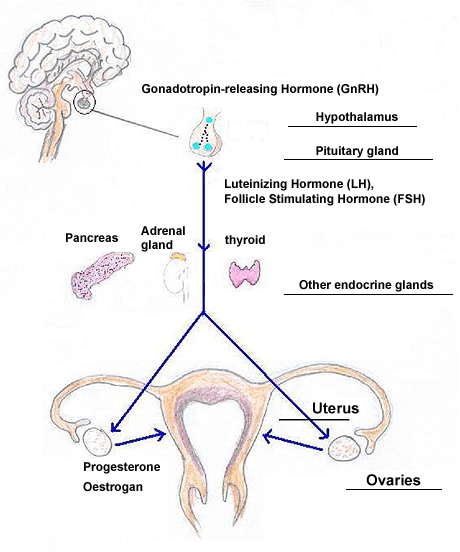|
Menstrual cycles or periods vary widely among women, they often vary within each individual woman as well. For most women, menstrual flow occurs every 21 to 35 days, lasts about 4 to 7 days, and produces 30ml of blood each time. It may also be considered normal if the timing and duration are outside these parameters, especially in adolescent girls or women approaching menopause, which are at the beginning or end of the reproductive years.
 |
The female reproductive and endocrine systems |
Menstruation is a result of interaction between the reproductive system and the endocrine system. Numerous factors may interrupt this complex yet delicate process, causing a variety of menstrual disturbances in women, such as heavy bleeding, skipped periods, longer periods, frequent periods, irregular periods, and bleeding between the periods. Doctors generally call it abnormal uterine bleeding and use specific medical terms to describe different types of abnormality.
Even after a full medical evaluation, doctor cannot find the specific cause of a menstrual disorder sometimes, the woman is then diagnosed with dysfunctional uterine bleeding (DUB), a problem related to changes in hormone levels. Dysfunctional uterine bleeding occurs mostly in adolescent girls (20%) and women older than 45 (more than 50%). Those (about 90% cases) who have this problem do not release an egg in their ovaries (ovulation), individuals also tend to have polycystic ovary syndrome or endometriosis.
You may have dysfunctional uterine bleeding if you have one or more of the followings:
 |
Your periods become irregular, more often (less than every 21 days) or longer (more than every 35 days) |
 |
Your bleeding lasts longer than a week |
 |
You have bleeding between periods |
 |
The bleeding is heavier, the blood loss is more than 80ml each time, or you pass blood clots or soak through a pad or tampon every hour for 2-3 hours. |
See a gynecologist if you have any big change in menstrual pattern, or experience the above for three or more menstrual cycles. Doctors will ask about your menstrual cycles in details, perform examinations and tests to check whether some usual causes of abnormal uterine bleeding are related, such as uterine fibroids, polyps, intrauterine device, pregnancy complications, cancers, bleeding disorders, medications, pelvic inflammatory disease, thyroid dysfunction, liver or kidney disease. When all these possible causes of abnormal uterine bleeding have been excluded, dysfunctional uterine bleeding is diagnosed.
Dysfunctional uterine bleeding should be focused on controlling the bleeding, stopping or regulating menstrual cycles. The treatment options are based on age, degree of bleeding, condition of the uterine lining and plan for future pregnancy.
Teenage: teenagers are usually in wait-and-see approach, as their hormone levels even out with time and the menstrual cycles will soon become more regular. If the bleeding is severe enough for treatment, doctors may prescribe hormones to help regulate the menstrual cycles, or use drugs to reduce bleeding.
Childbearing age: the treatment depends on whether the women are planning for pregnancy. Hormonal therapy can be used to regulate the periods and promote ovulations, surgical procedure may be necessary if the bleeding is severe.
Menopausal transition: because of changing in hormone levels, women tend to have abnormal uterine bleeding during the time. The bleeding is expected to go away when the transition process is completed. Treatment options depend on any childbearing plan and whether the symptoms interfered with daily life. Doctors may recommend a wait-and-see approach, hormones, or surgical procedures.
Traditional Chinese medicine (TCM) has a unique way in regulating the endocrine system and stop bleeding; it can be used alongside Western medicine in treating dysfunctional uterine bleeding. As TCM methods work on multiple aspects of the body at the same time, for example targeting on various metabolic processes in the hypothalamus-pituitary-sex gland axis, which creates a comprehensive regulating effect, and ensures a slow and gentle hormonal transition.
|